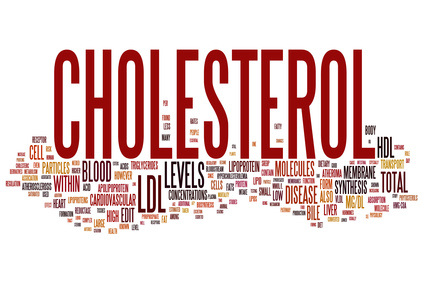
Atherosclerotic vascular disease is medical jargon for what the layman knows as “blocked arteries”. It causes blocked arteries in the heart, in the brain, and even the legs.
It has been proven irrefutably that atherosclerotic vascular disease is linked to cholesterol.
Cholesterol is a waxy, fat-like substance that is an important component in the production of cell walls and hormones. Most of the cholesterol is made by the body itself, with a little contribution from the food we eat.
So cholesterol is an important component of the body. So, how is it linked to heart disease?
Whereas normal amounts of cholesterol contributes to the normal structure and function of the body, excessive amounts (also known as hypercholesterolaemia) is toxic and contributes to vascular disease – in the heart, it could lead to a heart attack; in the brain, it could lead to a stroke.
| Cholesterol-lowering jab to help prevent heart disease |
Proof of this comes from many sources.

Epidemiology
This is the study of how often diseases occur and why it occurs in different groups of people. Some famous epidemiological studies on this include the MRFIT and FRAMINGHAM studies.
These have consistently shown that the higher your blood cholesterol levels, the higher the risk of getting vascular disease.
Epidemiology has also shown that atherosclerotic vascular disease is a multifactorial disease. This means that several conditions (also known as risk factors) contribute to its development.
Of these, high blood pressure, diabetes, smoking and a family history of vascular disease are particularly important.
The more of these risk factors that one has, the higher his or her risk. Thus, it would be more important for a diabetic to have his blood cholesterol lowered than a non-diabetic.
Pathology
This is a branch of medical science that determines the cause and nature of disease by examining body tissues.
Pathological studies from the mid-1800s up to recent times have shown that atherosclerotic vessels have increased amounts of cholesterol compared to normal vessels.
Genetic studies
These are studies of disease inheritance. People can be born with genetic abnormalities resulting in very high levels of cholesterol from a young age – they will develop heart attacks and strokes in their 20s and 30s – another bit of evidence that high blood cholesterol causes vascular disease.
In 1985, Dr Joseph Goldstein and Dr Michael Brown won the Nobel Prize in Medicine for proving this association.
Clinical trials with cholesterol lowering drugs
Many clinical trials have shown that lowering cholesterol with drugs, especially the group called statins, will reduce the risk of heart attacks and strokes.
The newer statins have also been shown to reduce the size of cholesterol deposits in the heart.
There are two real-life patient cases I came across which illustrate the potentially fatal consequences of hypercholesterolemia.
My youngest patients with vascular disease were sisters aged 18 and 21 years who were born into a family with severe high cholesterol (hyperlipidaemia).
They had atherosclerotic vascular disease (blocked arteries) and one of them died in her early 20s as a result of the disease.
Another patient was treated for a heart attack about 18 years ago. He almost died as his heart stopped so many times. Thankfully, he responded to treatment and is still alive and well today.
When the patient was admitted to hospital, his blood was very “oily” – very high lipid levels, especially a component called triglycerides. He had a history of “abusing” his diet – two to three glasses of teh tarik, fried noodles and roti canai were just part of his daily routine.
Following his heart attack, he was put on a strict diet and this itself brought about a significant improvement in his blood cholesterol levels.
Further improvements to medically accepted target levels were then achieved with drugs, which continues until today.
Misinterpretation of facts
Recently, it was claimed that the American Health Authority no longer considers cholesterol as a risk factor for the development of vascular disease – nothing can be further from the truth.
Both the American and European Societies of Cardiology continue to advocate treatment of elevated blood cholesterol.
The claim is a deliberate misinterpretation of the 2015–2020 Dietary Guidelines for Americans 8th Edition. On page 32 of the article, it is clearly stated that, “… though there is no longer a restriction to limit daily dietary cholesterol to 300mg/day, individuals should eat as little dietary cholesterol as possible”; they further state, “… eating patterns that include lower dietary intake of cholesterol are associated with reduced risk of cardiovascular disease”.
Foods rich in cholesterol, for example, red meats, cheese, butter, fried foods in general, also contain high levels of saturated fats that contribute to obesity – another risk factor for vascular disease.
I recommend that readers listen to Dr Neal Barnard’s lecture (George Washington University School of Medicine) titled “Cutting through the Cholesterol Confusion”.
Benefits of statins
I wish to address any confusion about the group of drugs called statins.

The benefits of these drugs have already been alluded to above. The statins do have side effects, but the facts are:
• Statins can cause mild increases in liver enzymes as shown in blood tests. This however is not associated with changes in liver function, and the development of liver failure is very rare.
Appropriate monitoring by your doctor will prevent untoward effects.
• There is a small risk of developing diabetes with statins, especially in those who have increased risk for diabetes – the obese, those with a strong family history of diabetes.
But studies show that the benefits of statin therapy in retarding the progression of atherosclerotic vascular disease far outweigh the small risk of developing diabetes.
• There is a worry that statins may cause memory loss, but in clinical studies, there is little to no evidence to support this.
• The most common side effect of statins is muscular pains, but muscle damage is very rare. Your physician will be able to alter your dosage of statins to reduce this side effect if you are susceptible.
Atherosclerotic vascular disease is a serious life threatening illness as it often strikes with little warning.
Lifestyle measures to prevent the development of risk factors are the first line of defence. Thus, weight loss, regular exercise, a healthy diet, NO SMOKING and periodic medical check-ups to identify and treat risk factors early, especially for those after the age of 50, are very important.
Statin therapy will be needed to control the disease, particularly in those who have major risk factors such as diabetes, hypertension, severe hyperlipidaemia and a strong family history.
It will particularly benefit those who have established disease, for example, patients who have suffered a heart attack, undergone bypass surgery or angioplasty.
These patients should not stop their drugs without first consulting their doctors.
Dr Kannan Pasamanickam is a consultant cardiologist.
Source:-The Star

Leave a Reply